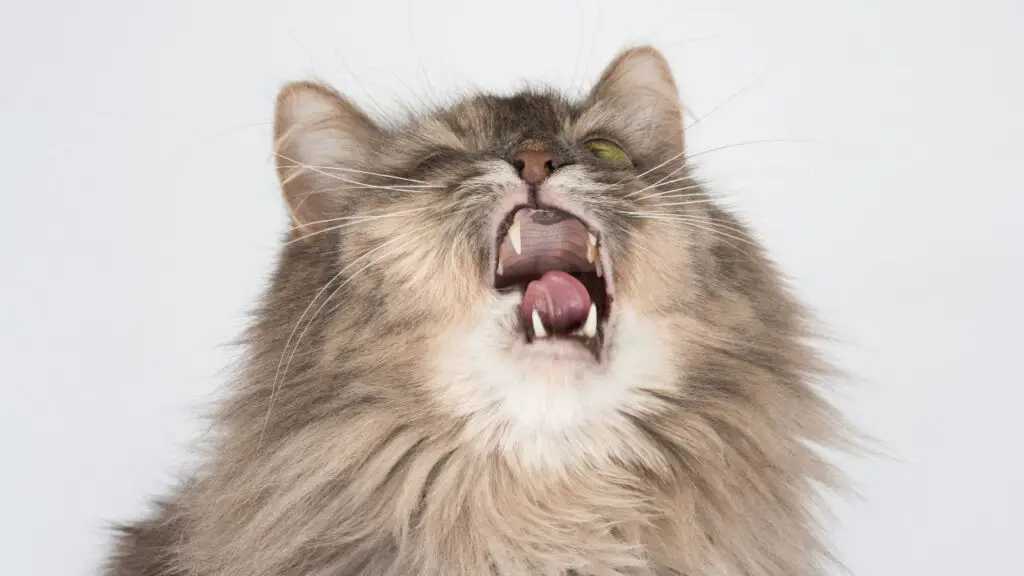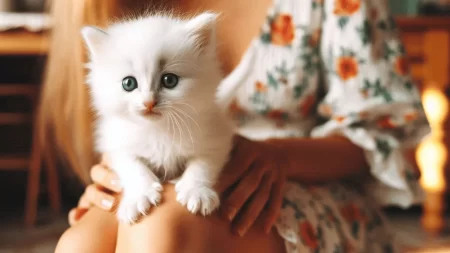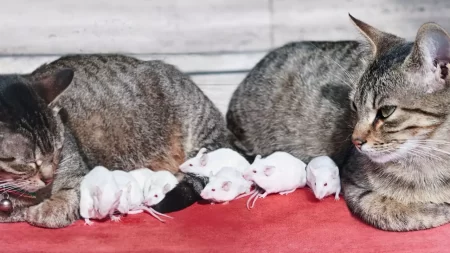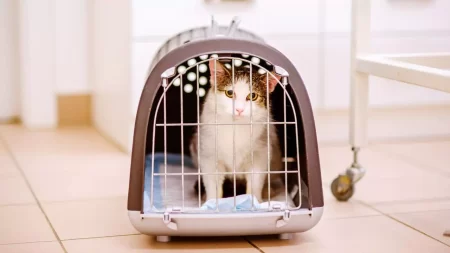Soft squeaks are a cat’s natural vocalization and some cats never learn to meow, while others may learn from an adult cat or from listening to humans speak.
Another possible reason for squeaking instead of meowing is a problem with the vocal cords or a disorder by birth.
It’s crucial to monitor your cat’s behavior and vocalizations, as some situations may require attention.
If your cat is making persistent squeaking noises, or if there are accompanying symptoms like allergies or respiratory infections, it’s advisable to seek veterinary consultation.
Remember, every cat is unique and may have its own way of communicating with you, so embrace the squeaks or any other quirky sounds your feline friend may make.
Why Cats Squeak?
Cats squeak instead of meowing. This is because meowing is to communicate with humans while squeaking is when they are caught off guard!
Kittens tend to squeak when they are playing with toys or other kittens. In rare cases, it could be a sign of a respiratory issue. If the squeaking is persistent and is accompanied by other symptoms, take your cat to the vet!
Fun Fact: cats can make up to 100 different sounds, far more than dogs!
Possible Health Concerns
A cat squeaking instead of meowing could be a health issue and needs veterinary attention. Reasons why this may happen include:
- Respiratory problems – Squeaking could mean an infection, asthma, or an object stuck in the throat.
- Trauma to vocal cords – Injuries to the vocal cords can stop the cat from meowing, making it squeak instead.
- Neurological issues – Nerve damage or other neurological problems might stop the cat from meowing, causing it to squeak.
If your cat squeaks instead of meowing, it’s best to take them to the vet. Early detection and treatment can help prevent further issues and keep your cat healthy.
Behavioral Reasons for Squeaking
Cats can sometimes squeak, instead of meowing. This is a unique way they communicate their feelings. Here are some possible explanations:
- Excitement: When cats are excited or playful, they may emit high-pitched squeaks.
- Intimidation: Squeaking can be used to intimidate or warn other animals when feeling threatened or aggressive.
- Distress: Cats may squeak in pain, discomfort, or fear.
- Breed: Siamese or Oriental cats may have a tendency to squeak instead of meow. It could be normal communication for them.
- Attention: Some cats may squeak to grab their owner’s attention or to ask for affection.
How to Respond When Your Cat Squeaks?
Siamese and Burmese cats are known for making high-pitched vocalizations. Older cats may develop changes in their vocal cords that make them sound different.
If the squeaking is sudden, or if your cat has other symptoms like coughing or wheezing, you should take it to the vet. In most cases, squeaking is nothing to worry about.
To respond to your cat’s squeaking, mimic it or give them affection.
Tips for Reducing Squeaks
To stop squeaking, these are some tips:
- Don’t give a reaction to the squeaking, to stop it becoming a habit.
- Give your cat toys and playtime to keep them busy.
- Make sure they have enough food and a clean litter box.
- If they are alone, get them a companion like another cat.
- If you want a quiet cat, choose a breed like Russian Blue or British Shorthair.
Do certain breeds of cats tend to squeak instead of meowing?
Many people believe that all cats meow, but this isn’t true.
Although meowing is the most familiar sound made by cats, some breeds make different noises.
Some cats even squeak instead of meowing, and the cause of this is unclear, though it may be due to genetics or vocal cord damage.
Certain breeds, like Siamese cats, are more vocal than others.
It’s crucial for cat owners to observe their pet’s vocalizations and behavior because alterations could signal a potential health problem.
Every cat is distinct, and their vocalizations can differ significantly.
Can a cat’s age or gender affect whether it meows or squeaks?
As cats age, they may develop health issues such as an overactive thyroid or kidney disease, causing them to meow excessively.
Kittens are usually more vocal than senior cats, as they are still learning to communicate and meow for attention.
Additionally, not all cats learn to meow, and some may only make soft squeaking sounds.
Gender does not typically play a role in a cat’s vocalizations.
So, whether your cat is a male or female, their meows and squeaks are just a part of their unique personality.
Do cats use squeaks to communicate with other cats or just with humans?
Yes, cats uses squeak sound to communicate with both humans and other cats.
While cats meow at humans for action or attention, they generally avoid meowing at other cats.
Instead, they rely on an array of sounds, such as squeaks, growls, hisses, and chatters, for interaction with each other.
Squeaks often come from amicable cats when approaching other cats or humans.
Apart from vocalizations, cats convey feelings and intentions through body language, using postures and facial expressions.
Do cats that have been spayed or neutered tend to squeak more than those that haven’t?
Cats, after spaying or neutering, are often thought to squeak more frequently.
Yet, no concrete link exists between these factors.
The misconception may stem from unaltered cats producing loud, irritating caterwauling during the heat.
After spaying or neutering, heat cycles cease, reducing caterwauling occurrences. However, this doesn’t imply that altered cats squeak more.
Research indicates that spaying and neutering not only extend a cat’s life but also make them less hostile and more loving due to reduced hormones linked to sexual behavior.
Consequently, spaying or neutering your cat proves advantageous for both their health and disposition.
Why do some cats switch from meowing to squeaking as they get older?
As cats age, some may switch from meowing to squeaking.
This change in vocalisation is due to the maturation of their vocal cords.
Over time, the vocal cords develop, resulting in a deeper voice. However, some cats may retain their high-pitched, squeaky meow throughout their lives.
Excitement or happiness may also cause a cat to emit squeaky sounds.
On the other hand, damage to the vocal cords or medical problems such as laryngitis may cause a cat to switch from meowing to squeaking.
If a cat owner notices their feline friend making unusual sounds, it is advisable to seek veterinary attention to rule out any underlying medical conditions.
Conclusion
In summary, if your cat squeaks instead of meowing, it’s likely they’re trying to express something.
Squeaking may signify an urgent message, like hunger or distress.
Some cats are more vocal. It’s important to note your cat’s body language, context and other vocalizations to interpret their squeaks.
If squeaking is accompanied by signs of unease or illness, consult with a vet.
As owners, we must recognize our cat’s communication to foster a beneficial relationship.







